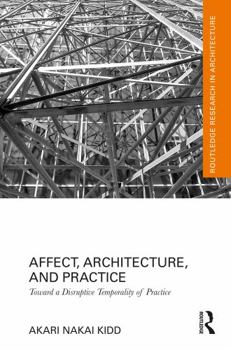Affect, Architecture, and Practice: Toward a Disruptive Temporality of Practice
Affect, Architecture, and Practice builds on and contributes to work in theories of affect that have risen within diverse disciplines, including geography, cultural studies, and media studies, challenging the nature of textual and representational-based research. Although numerous studies have examined how affect emerges in architectural spaces, little attention has been paid to the creative process of architectural design and the role that affect plays in the many contingencies and uncertainties that arise in the process.
The book traces the critical, philosophic, and architectural theories to examine how affect, architecture, and practice are interlinked. Through a series of conversations and reflections, it examines three key contemporary architects, their practices and projects, all within a single coherent theme. Reiser + Umemoto (RUR Architecture DPC), USA, Kerstin Thompson Architects, Australia, and Shigeru Ban Architects, Japan, are critically studied through the lens of different aspects of practice, namely image-making, the design process, and the making of an everyday object/material.
Through this investigation, author Akari Nakai Kidd demonstrates how affect theory allows a critical interrogation of the in-betweens of practice, its liminality and limits. It questions the stability of objects, the smooth temporality of practice, and its often under-conceptualised non-human dimensions. More significantly, the book demonstrates architectural practice's contribution to the reconceptualisation of theories of affect.
Related Subjects
Architecture




